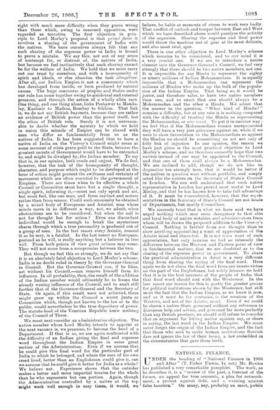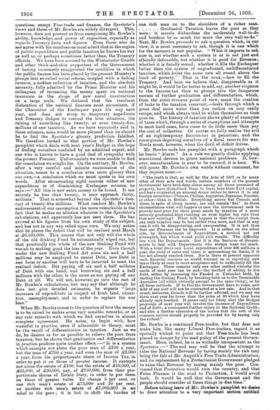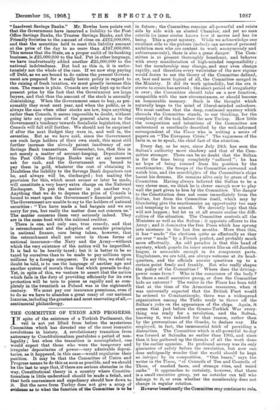NATIONAL FINANCE.
TINDER the heading of "National Finance in 1908 and After" (T. Fisher Unwin, Is. net) Mr. Bowles has published a very remarkable pamphlet. The work, as he describes it, is a "review of the past, a forecast of the future, an appeal for true accounts, a plea for retrench- ment, a protest against debt, and a warning against false taxation." On many, nay, probably on most, public questions, except Free-trade and finance, the Spectator's views and those of Mr. Bowles are widely divergent. This, however, does not prevent us from recognising Mr. Bowles's ability, knowledge, and power of exposition, especially as regards Treasury facts and figures. Even those who do riot agree with his conclusions must admit that in the region of public expenditure and public taxation he knows his way as well as, or perhaps sometimes better than, the Treasury officials. We have been accused by the Westminster Gazette and other thick-and-thin supporters of the Government of having immensely exaggerated the condition in which the public finance has been placed by the present Ministry's plunge into so-called social reform, coupled with a falling revenue, a sudden reduction of taxation, and the absolute necessity, fully admitted by the Prime Minister and his colleagues, of increasing the money spent on national insurance in the shape of new naval construction on a large scale. We declared that the resultant dislocation of the national finances must necessitate, if the Chancellor of the Exchequer pays his way next year, and does not stoop to temporary expedients and Treasury dodges to conceal the true situation, the raising of something like twenty, or even twenty-five, millions of new taxation. As we have repeatedly said in these columns, none would be more pleased than we should be to find the Spectator's gloomy prediction falsified. We therefore turned to that portion of Mr. Bowles's pamphlet which deals with next year's Budget in the hope of finding ourselves confuted by an admitted expert, and one who is known to have a good deal of sympathy with the present Premier. "Unfortunately we were unable to find the consolation we sought for. On the contrary, Mr. Bowles, after a very careful and minute examination of the situation, comes to a conclusion even more gloomy than our own,—a conclusion which we must quote in his own words. After enumerating eight sources either of new expenditure or of diminishing Exchequer returns, he says :—" All this is new extra money to be found. It can scarcely be less than twenty, it may approach thirty, millions." That is somewhat beyond the Spectator's fore- cast of twenty-five millions. What renders Mr. Bowles's endorsement of our assumption the more remarkable is the fact that he makes no allusion whatever to the Spectator's calculations, and apparently has not seen them. He has arrived at his figures from his own study of the subject, and has not in any way relied upon ours. We may notice that he places the deficit that will be realised next March at £6,500,000. This means that not only will the whole of the old Sinking Fund be automatically wiped out, but that practically the whole of the new Sinking Fund will vanish in making good the loss of the year. Even though under the new Sinking Fund Act some six and a half millions may be employed to cancel Debt, new Debt in one form or another will have to be incurred to meet the realised deficit. But paying off six and a half millions of Debt with one hand, and borrowing six and a half millions with the other, is the same as not paying off any Debt at all. We will not, however, go into the rest of Mr. Bowles's calculations, but may say that although he does not give detailed estimates, he expects "large increases of expenditure in respect of Irish land, educa- tion, unemployment, and in order to replace the war loan."
When Mr. Bowles comes to the question of how the money is to be raised he makes some very sensible remarks, or at any rate remarks with which we find ourselves in almost complete agreement. He notes, to begin with, how wasteful in practice, even if admissible in theory, must be the result of differentiation in taxation. Just as we do, he desires as far as possible to relieve the poor from taxation, but he shows that graduation and differentiation in practice produce quite another effect :—" It is a system which exempts not alone the poor man of £100 a year, but the mau of £700 a year, and even the man of .22,000 a year, from his proportionate share of Income Tax, in order to put it on those of greater income. It exempts WA alone the estate of £100, but the estate of £10,000, of £25,000, of £50,000, nay, of £150,000, from their pro- portionate shares of Estate Duty, in order to put them on those of greater value. To charge 5 per cent. on one rich man's estate of £75,000 and 10 per cent. on another rich man's estate of £1,000,000 is no relief to the poor ; it is but to shift the burden of one rich man on to the shoulders of a richer man.
Graduated Taxation leaves the poor as they were ; it merely disburdens the moderately well-to-do and burdens by so much the more the very well-to-do." Next, Mr. Bowles proceeds to ask a question which, in our view, it is most necessary to ask, though it is one which for the moment is not popular. "What it imports to ask. now is, not whether such a. system is or is not just and ethically defensible, but whether it is good for Revenue; whether it is fiscally sound; whether it fills the Exchequer better than the system of ungraduated, undifferentiated taxation, which levies the same rate all round above the limit of poverty." That is the crux,—how to fill the Treasury. And here we believe that, disagreeable as it might be, it would be far better to add, say, another sixpence to the Income-tax than to plunge into the dangerous morass of further graduation and differentiation, which, from the strict revenue point of view, mean the creation. of leaks in the taxation reservoir,—leaks through which a. great deal more water than you reckon on may easily escape, and which always tend to widen themselves as tima goes on. The history of taxation shows plenty of examples of taxes which, through a series of exemptions and attempts to meet hard cases, have come to do little more than pay the cost of collection. Of course we fully realise the evil of an eighteenpenuy Income-tax in peacetime, and the consequent depriving ourselves of a fiscal reserve for war. Needs must, however, when the devil of deficit drives.
Mr. Bowles ends his pamphlet with a paragraph which he heads "Alarm." As a rule we greatly dislike applying sensational devices to grave national problems. If, how- ever, sensationalism is ever to be excused, it is here. We will quote Mr. Bowles's own words without comment, for they require none:— " The truth is that, as well by the Acts of 1907 as by many other of their acts and words, certain members of the present Government have bred deep alarm among all those possessed of property, have disinclined them to leave here their fluid capital, and have originated an unusual desire rather to invest it in any foreign securities—Chinese, Chilian, Argentine, Japanese, Russian, or other—than in British. Everything moves but Consols, and these, in spite of cheap money, are and remain 'fiat.' In these circumstances what will happen in case the Government seek to provide next year for their great needs by taxation of a more severely graduated kind reaching an even higher top rate than that now existing? What will happen is that the receipt from any such taxation may be less rather than more, and that in any case it will be disappointing, and exasperating. It is not thus that our Finances can be improved. It is rather on the other side, by Retrenchment of Expenditure, a method not yet attempted, but which would yield rich results. The difficulty lies with the Departments. But it is the business of Govern- ments to deal with Departments who always want too much. With a total State and Local expenditure of over 800 millions a year, the yield of rates and taxes is approaching its limits, if it has not already reached them. Nor is there at present apparent such • financial resource as would warrant us in expecting new taxes likely at once to meet acceptance and to sufficiently fill the Exchequer. There remains only one other method whereby the needs of next year can be met—the method of adding to the Debt, either by increasing the Funded or Unfunded Debt, by raiding the Sinking Fund, by breaking faith as to the Terminable Annuities (all which virtually amount to the same thing), or by all these methods. If to this the Government have to come, new debt of any sort will not be contracted at a low rate. And in that event, moreover, Consols will be further affected, and we may see them next year far lower than the price of 80 which they have already once touched. It seems only too likely that the Budget proposals of next year will involve the increase of Expenditure and of Debt; a consequent further injury to the National Credit; and also a further extension of the notion that the cost of the common service should properly be provided for by taxing only the richest."
Mr. Bowles is a convinced Free-trader, but that does not make him, like many Liberal Free-traders, regard it as specially wicked to point out that Free-tra,de has been placed in danger by the mad policy of the present Govern- ment. Here, indeed, he is as wickedly unrepentant as the Spectator :—" The end may well be that the attempt to raise the National Revenue by taxing mainly the rich may bring the fall of Mr. Asquith's Free Trade Administration, and its replacement by a Protectionist Government pledged to raise that Revenue by taxing mainly the poor. Con- vinced that Protection would ruin the country, and that False Finance is the road to Protection, I would avoid both. It would be well. that the Government and. the people should consider of these things in due time."
,Before taking leave of.111r. Bo.wles's, pamphlet we desire to draw attention to a very important section entitled "Insolvent Savings Banks." Mr. Bowles here points out that the Government have incurred a- liability to the Post Office Savings Banks, the Trustee Savings Banks, and the Friendly Societies to the amount of close on £212,000,000, and that the securities held to meet this liability amount at the price of the day to no more than £187,000,000. This means that the State, on a proper audit of its banking business, is £25,000,000 to the bad. Put in other language, we have inadvertently added another £25,000,000 to the national indebtedness. But bad as this is, it is unfor- tunately not the whole of the case. If we now stop paying off Debt, as we are bound to do unless the present Govern- ment are prepared for a really heroic policy in regard to the raising of fresh taxation, we must greatly increase this sum. The reason is plain. Consols are only kept up to their present price by the fact that the Government are large buyers, and that thus the amount of the stock is annually diminishing. When the Government cease to buy, as pre- sumably they must next year, and when the public, as is always the case when other stocks are low, buys anything rather than Consols, it seems impossible to doubt, without going into any question of the general alarm as to the Government's tendency towards Socialistic legislation, that Consols will fall still further. We should not be surprised if after the next Budget they were in, and well in, the seventies. But as we have said, since the Government are such large holders of their own stock, this must still further increase the already patent insolvency of our Savings Bank transactions. Remember, too, that this is not merely a matter of account-keeping. Depositors in the Post Office Savings Banks may at any moment ask for cash, and the Government are bound to pay them in gold, whatever the cost of obtaining it. Doubtless the liability to the Savings Bank depositors can be, and always will be, discharged ; - but making the provision for this, which must sooner or later be made, will constitute a very heavy extra charge on the National Exchequer. To put the matter in yet another way. Anything that we do to depress the price of Consols is bound to react upon the Government's financial position. The Government are unable to say to the holders of national securities : "You have made a bad bargain and we are sorry for you, but really the matter does not concern us." The matter concerns them very seriously indeed. They are in the same boat with the national creditor.
There is one, and only one, true remedy, and that is retrenchment and the adoption of sounder principles in national finance, care being taken, however, that the retrenchment shall not occur in those forms of national insurance—the Navy and the Army—without which the very existence of the nation will be imperilled. It is bad. to be heavily taxed; but it is better to be so taxed by ourselves than to be made to pay millions upon millions by a foreign conqueror. To say this, we shall no doubt be told, is to use the language of another age and another system of morals than that which prevails to-day. Yet, in spite of this, we venture to assert that the nation which fails in the duty of providing efficiently for its own protection will be torn to pieces as rapidly and as com- pletely in the twentieth as Poland was in the eighteenth century. We must pay our insurance premiums, even if to do so we have to abandon a great many of our national luxuries, including the greatest and most enervating of all,— sentimental philanthropy.








































 Previous page
Previous page